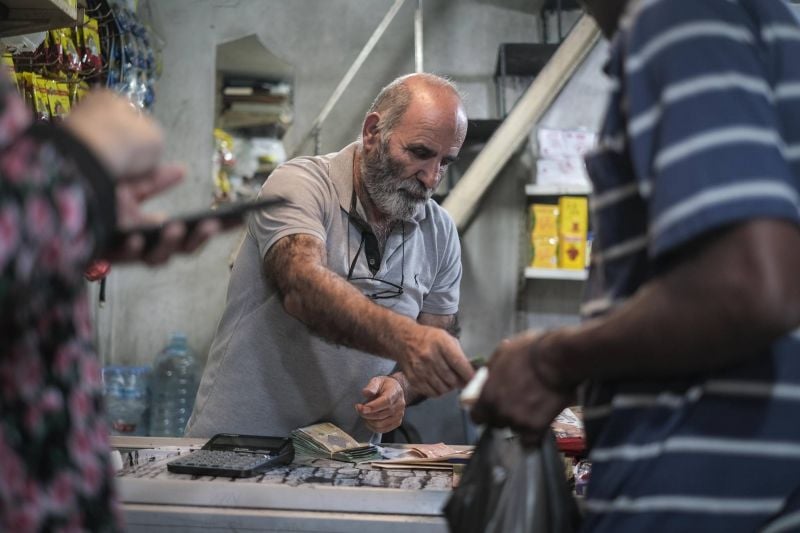
Abu Ali, the husband of minimarket owner Salam Srour in Beirut's southern suburbs, helps customers as they buy groceries. Oct. 27, 2023. (Credit: João Sousa/L'Orient Today)
Follow our live coverage here.
BEIRUT — Pushing a cart with bags of rice, discounted pasta, tuna and dozens of cans of ready-to-eat beans, grocery shopper Marie Mazboud tells L’Orient Today that she is preparing her family “for the worst.”
“I have kids to think of,” she says.
Since Oct. 7, when a war broke out between Hamas and Israel – which has seen devastating Israeli strikes on the blockaded Gaza Strip – Lebanon’s Hezbollah has also been exchanging fire with Israeli forces across the border. The fighting has raised the specter of a larger regional war, including in Lebanon.
“I lived this time and time again, when food and money were scarce, when I was growing up in the Civil War,” Mazboud says, speaking from the Fahd supermarket, a grocery store in Beirut’s Furn al-Shubbak suburb.
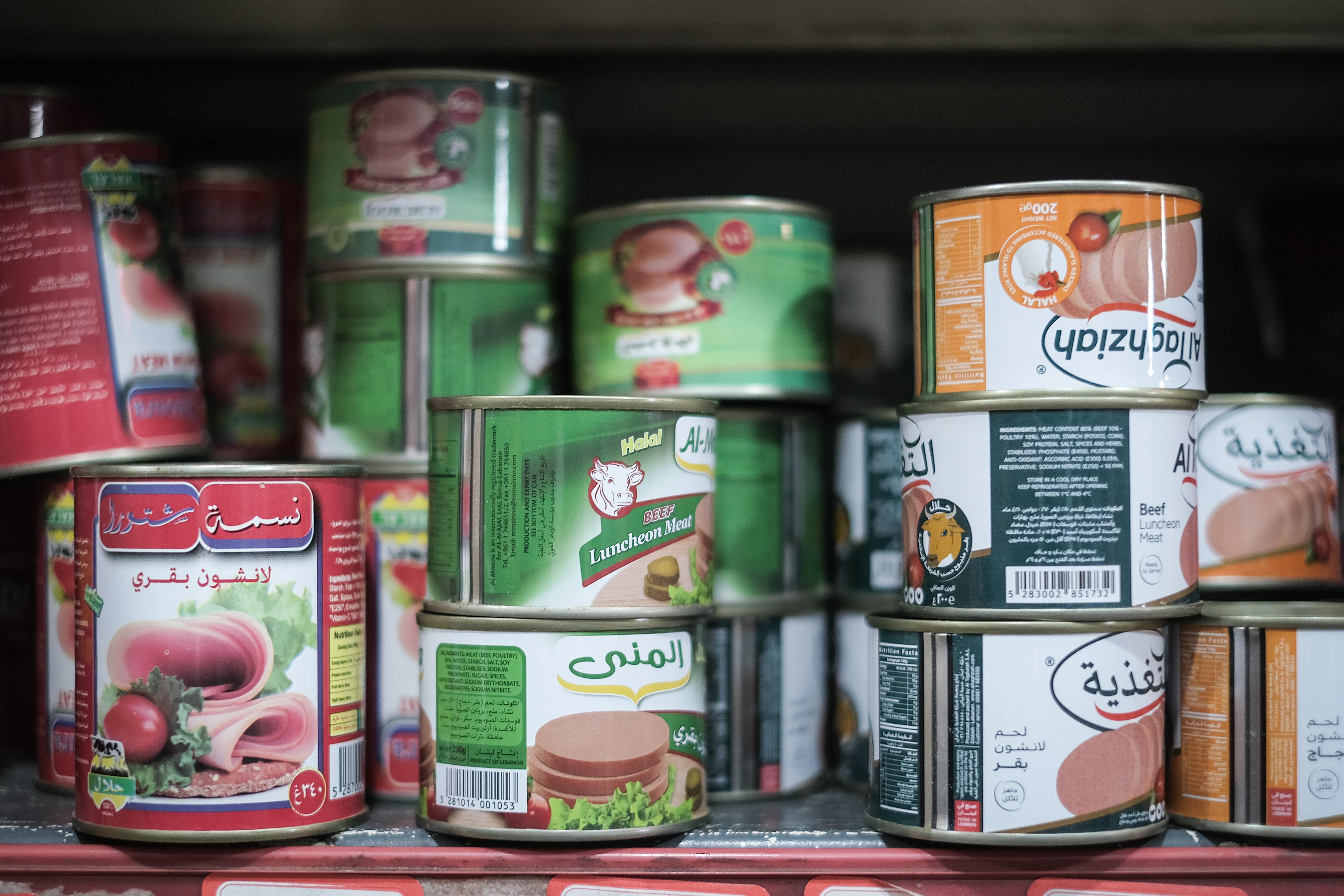 Canned lunchmeat for sale at Salam Srour's minimarket in Beirut's southern suburbs. Oct. 27, 2023. (Credit: João Sousa/L'Orient Today)
Canned lunchmeat for sale at Salam Srour's minimarket in Beirut's southern suburbs. Oct. 27, 2023. (Credit: João Sousa/L'Orient Today)
“It feels like a deja vu, I’m doing what my mother always did.”
Bulk shopping is a habit that goes back to Lebanon’s 15-year Civil War, as well as the most recent war with Israel in 2006, which lasted a month and saw cutoffs of some food supplies.
“My late father, may God has mercy on his soul, bought a pantry during the harshest days of the Civil War that we would only use at times when stores would be closed for weeks on end,” Lina Naim tells L’Orient Today as she shops at the Harkous supermarket in Beirut’s southern suburbs.
On Oct. 9, two days into the war, Beirut and Mount Lebanon Bakery Owners’ Union head Nasser Srour urged citizens to not stockpile bread, adding in a public statement that sufficient stocks were available should the conflict spread to Lebanon.
Still, with Hezbollah leader Hassan Nasrallah set to speak publicly this Friday in his first address since the start of the war, and as cross-border skirmishes intensify, a larger conflict remains somewhat of a possibility.
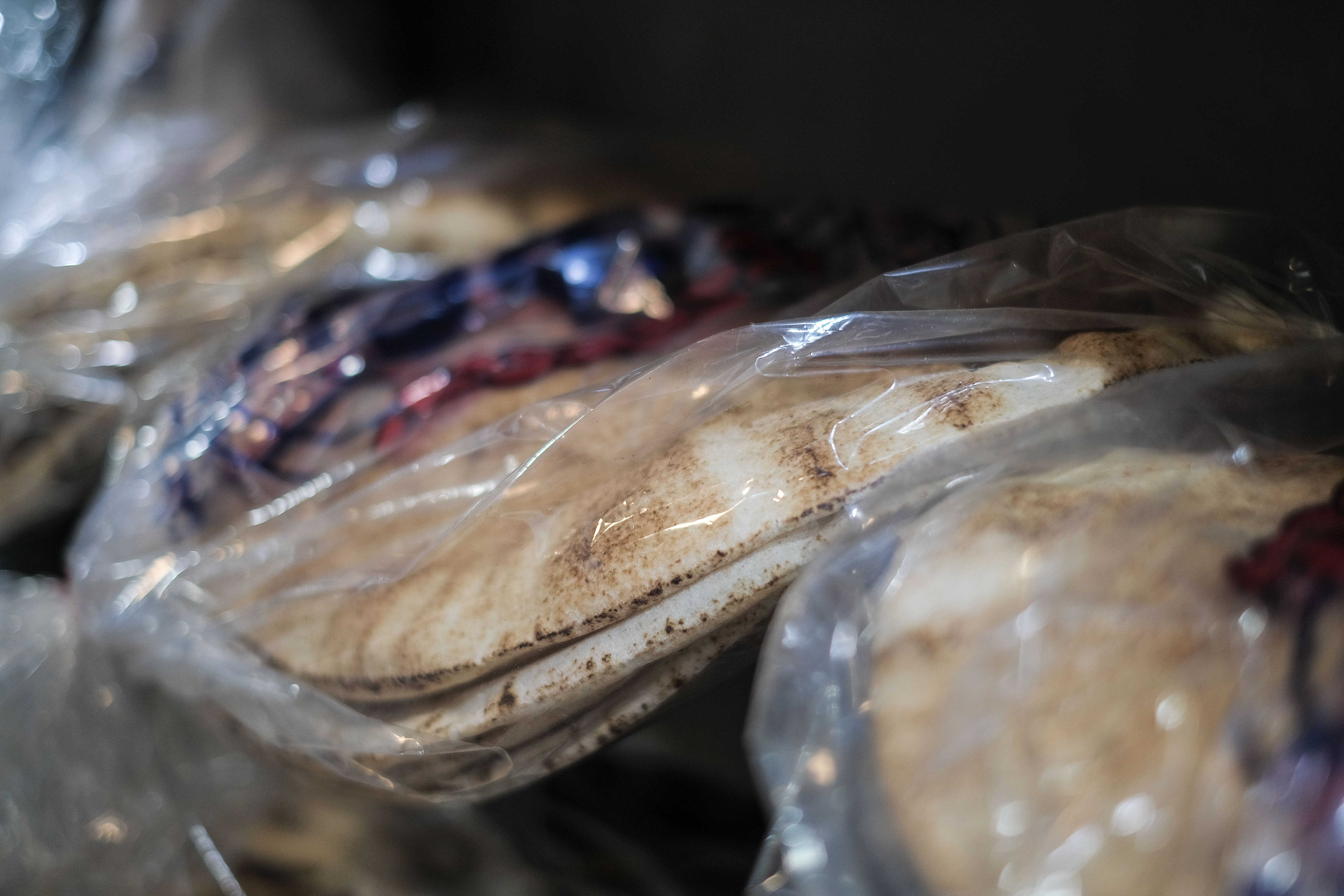 Bread for sale at Salam Srour's minimarket in Beirut's southern suburbs. Oct. 27, 2023. (Credit: João Sousa/L'Orient Today)
Bread for sale at Salam Srour's minimarket in Beirut's southern suburbs. Oct. 27, 2023. (Credit: João Sousa/L'Orient Today)
“You can say we are used to it,” says Um Nezar, another shopper in Harkous. “Along with our backpack to leave Beirut if things get violent, I have two full bags of food and sanitary products that we’ll take with us that would last us three full months.”
Meanwhile, Dana Hmayed, a mother of a one-year-old boy, says that “bulk buying in those troubling times is a good idea,” as she shops at a minimarket in Tariq al-Jadideh.
“But unfortunately, I don’t have enough money to do that. I work as a nursery teacher and barely make ends meet,” she says.
Holding a pack of bread, two cheese boxes, and a bottle of Pepsi, Hmayed says she can only afford to shop day by day.
‘We aren’t preparing ourselves…we won’t be left alone’
Others, however, tell L’Orient Today they are less worried and feel they are in “safe hands,” should Hezbollah and Israeli forces up the ante.
In one minimarket in the southern suburbs of Beirut, Hussein Hamdan, in his late 20s, maintains that “things are normal.”
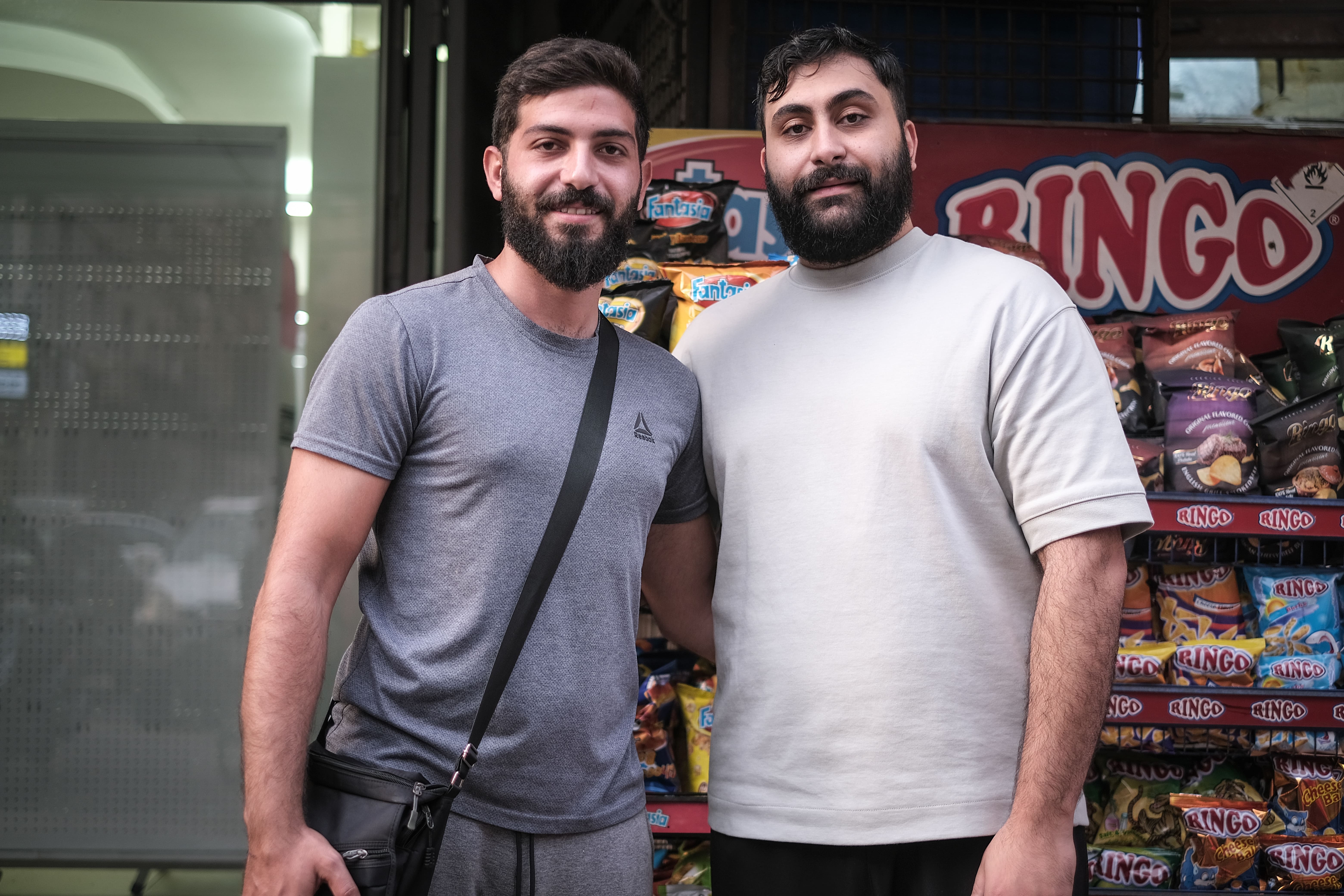 Shoppers Hussein Hamdan and Ali al-Amin at Salam Srour's minimarket in Beirut's southern suburbs. Oct. 27, 2023. (Credit: João Sousa/L'Orient Today)
Shoppers Hussein Hamdan and Ali al-Amin at Salam Srour's minimarket in Beirut's southern suburbs. Oct. 27, 2023. (Credit: João Sousa/L'Orient Today)
“We don’t have to prepare ourselves in our community in advance, because we know that in case of war we won’t be left alone. We have someone who has our back,” he adds, referring to Hezbollah leader Hassan Nasrallah.
The owner of the minimarket, Salam Srour, tells L’Orient Today that two days after Hamas’ “Al-Aqsa Flood” operation on Oct. 7, local residents were worried about a war and bought items from her store in bulk – though mainly moassal tobacco for shisha and packs of cigarettes.
“It might be a coping mechanism,” she guesses.
However, now people have gone back to shopping “normally,” she says.
Ali al-Amin, another shopper at Salam’s minimarket, worries that if people were to bulk buy, it would create a crisis in the market, and “in case of war, just in the case of the economic crisis, we know that Hezbollah has our back.”
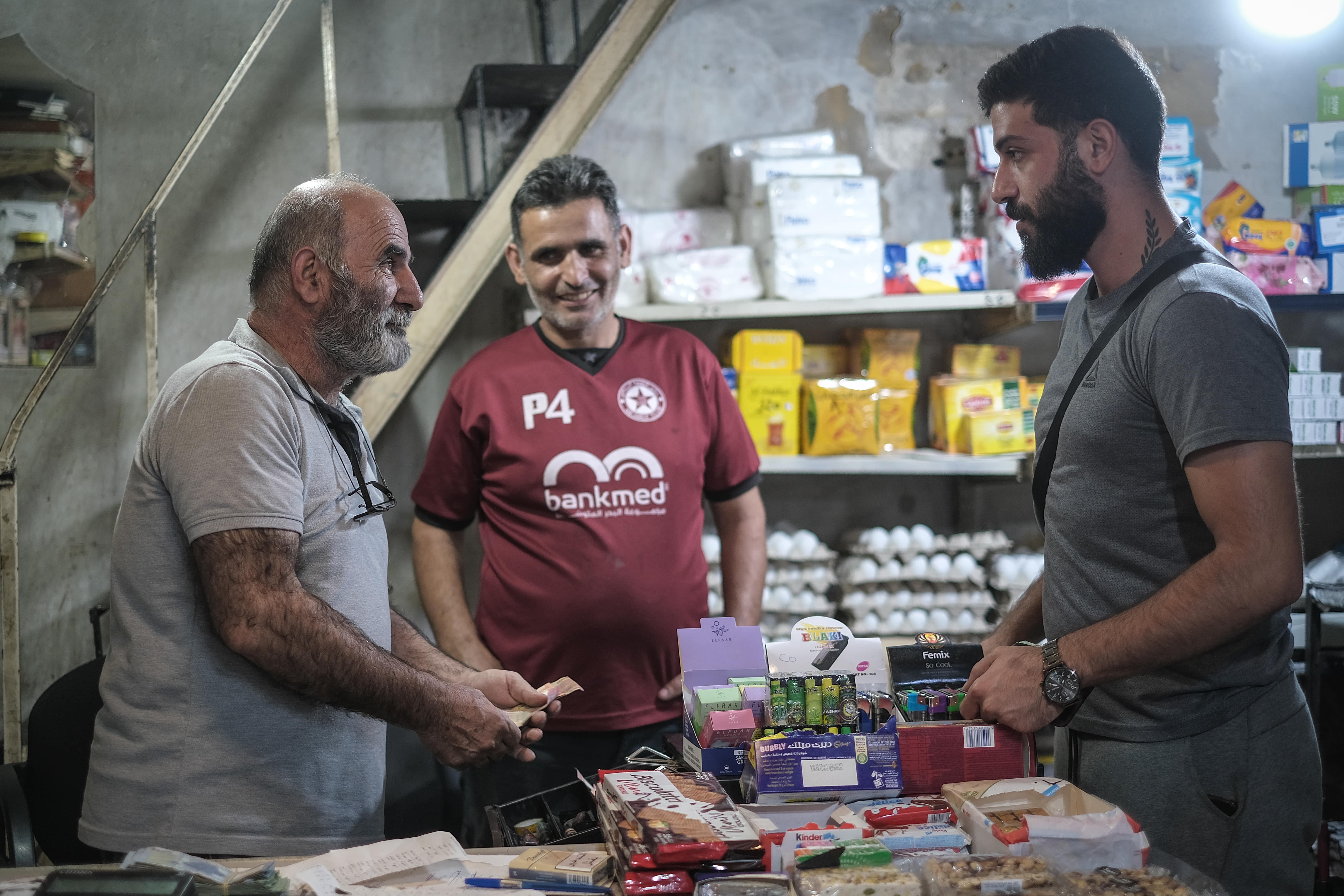 Shopper Hussein Hamdan buys items from Abu Ali, husband of minimarket owner Salam Srour, in Beirut's southern suburbs. Oct. 27, 2023. (Credit: João Sousa/L'Orient Today)
Shopper Hussein Hamdan buys items from Abu Ali, husband of minimarket owner Salam Srour, in Beirut's southern suburbs. Oct. 27, 2023. (Credit: João Sousa/L'Orient Today)
“When the crisis hit, they created Sajjad supermarket, so we know they won’t leave us this time too,” he says, referring to the discount supermarket chain launched by Hezbollah in 2021, at the height of the economic crisis. The stores mainly sell imported Iranian goods.
Elsewhere in Beirut, in the Tariq al-Jadideh neighborhood, minimarket shopper Dareen Fsai says she isn’t stockpiling groceries, either.
“The second Israel — God forbid — starts striking, the only thing you would be thinking of is leaving the building with your loved ones, not taking cartons of food goods,” she laughs.